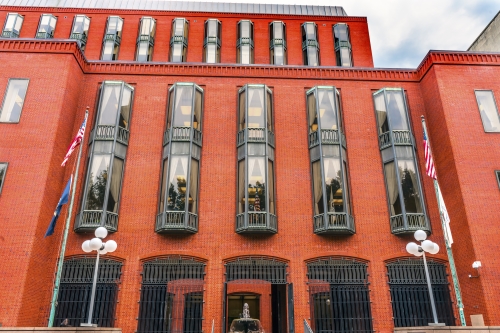Google PTAB Wins Stand as CAFC Denies Patent Owner’s Bid for Director Rehearing
“Addressing CyWee’s…contention that the extension of the deadline for FWD due to joinder was improper because the Board lacks authority to do so, the CAFC said that the statute expressly notes…that the Director ‘may adjust the time periods in this paragraph’…and that ‘[t]he Director has delegated that time-adjustment authority to the Board.’”
The U.S. Court of Appeals for the Federal Circuit (CAFC) today upheld in a precedential decision the U.S. Patent and Trademark Office’s (USPTO’s) denial of Director rehearing for two inter partes review (IPR) decisions in which the Patent Trial and Appeal Board (PTAB) found CyWee Group Ltd.’s U.S. Patent Nos. 8,441,438 and 8,552,978 unpatentable.
The IPRs were brought by Google in 2018 challenging certain claims of the two patents, which cover 3D pointing devices. The PTAB instituted the two IPRs within three months of CyWee’s preliminary responses to the petitions, and following institution, the IPRs were joined by other parties, including Samsung, LG and Huawei. Because of the joinders, the PTAB extended the deadline for its response by one month beyond the statutory deadline of one year from institution, to January 10, 2020. The Board issued final written decisions (FWDs) in both IPRs on January 9, 2020, finding all claims unpatentable for obviousness.
CyWee appealed both decisions to the CAFC in March 2020, in part arguing that the appointment of PTAB judges was unconstitutional under the Appointments Clause. The CAFC affirmed the PTAB’s decisions in March 2021 under its own precedent on the Appointments Clause issue at the time, Arthrex v. Smith & Nephew. CyWee’s petition for rehearing or en banc rehearing were denied. However, the Supreme Court subsequently issued its ruling in United States v. Arthrex, holding that, since APJs were not principal officers and their decisions were not reviewable by principal officers, this did give rise to Appointments Clause violations.
Following the Supreme Court ruling, CyWee asked the CAFC to recall its previous mandate and remand to the USPTO for reconsideration under the High Court’s Arthrex ruling. The CAFC agreed and remanded “for the limited purpose of allowing CyWee the opportunity to request Director rehearing of the final written decisions.” At the time, Commissioner for Patents Drew Hirshfeld was performing the duties of the USPTO Director and Deputy Director, so the requests for Director review were sent to him and he denied rehearing. CyWee then appealed to the CAFC again.
On appeal for the second time, CyWee argued in part that the Commissioner did not have the authority to review decisions as contemplated by the SCOTUS Arthrex ruling. Google moved to stay the appeal pending the CAFC’s consideration of the remanded Arthrex, Inc. v. Smith & Nephew, Inc. (Arthrex II) in which a decision issued in April 2022. That decision rejected challenges to the Commissioner’s authority under Arthrex and the CAFC thus held in CyWee’s appeal that its challenges under the Appointments Clause, the Federal Vacancies Reform Act, and the Constitution’s separation of powers were foreclosed by Arthrex II and that the CAFC’s decision in In re Palo Alto Networks, Inc. “compels rejecting its Appointments Clause challenge regarding the institution decisions.”
CyWee also attempted to argue that the Board’s FWDs and institution decisions were untimely, however, because the USPTO Director must be able to review both types of decisions within the applicable statutory deadlines. The CAFC called this argument “meritless” and explained that the statutory deadlines “say nothing of deadlines for any further Director review of those decisions.” And addressing CyWee’s further contention that the extension of the deadline for FWD due to joinder was improper because the Board lacks authority to do so, the CAFC said that the statute expressly notes in Section 316(a)(11), that the Director “may adjust the time periods in this paragraph [(e.g., the one-year-from-institution deadline for final written decisions)] in the case of joinder under [§] 315(c)” and that “[t]he Director has delegated that time-adjustment authority to the Board.”
Finally, the CAFC rejected CyWee’s assertion that “because there was no ‘right’ for Director review of the Board’s extension decisions, an Appointments Clause violation has occurred.” The court explained that, if CyWee meant that the Director had no right to review those decisions, it “is plainly mistaken” because “as a matter of law, the usual rule is that an agency head’s delegation of her authority to subordinates is premised, at least in part, on the delegating official maintaining the power to review the decisions of the delegee.” In re Palo Alto Networks.
In the alternative, said the CAFC, if what CyWee meant was that there was no right for it to seek or obtain Director review, “even if it were correct on that score, that also would not give rise to an Appointments Clause violation” because “the Appointments Clause was intended to prevent unappointed officials from wielding too much authority, not to guarantee procedural rights to litigants, such as the right to seek rehearing from the Director.” Piano Factory Grp., Inc. v. Schiedmayer Celesta GmbH.
The Federal Circuit’s opinion also said in a footnote that it denied CyWee’s attempt to add an argument in its supplemental brief centered on the recent Government Accountability Report (GAO) findings. That report found PTAB judges feel pressure from USPTO leadership in their decision-making, that APJs have stated that the amount of oversight exercised by USPTO officials over PTAB trials has increased over time, and some APJs characterized the oversight as “pervasive” and “oppressive.” However, the CAFC noted in the footnote that the supplemental briefing was “ordered solely to assess which arguments in its opening brief survived our later-issued precedent” and thus, new arguments could not be considered.
Image Source: Deposit Photos
Image ID: 161261406
Author: billperry
Eileen McDermott
Eileen McDermott is the Editor-in-Chief of IPWatchdog.com. Eileen is a veteran IP and legal journalist, and no stranger to the intellectual property world, having held editorial and managerial positions at […see more]







